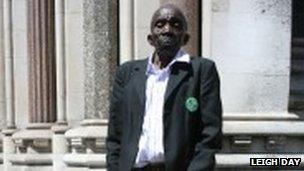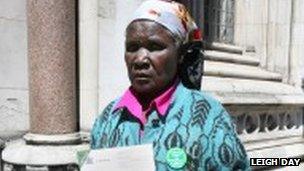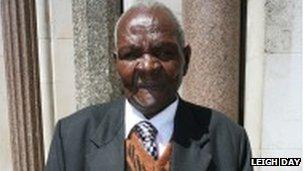Kenya's Mau Mau uprising: Victims tell their stories
- Published
Foreign Secretary William Hague has expressed regret and announced compensation for Kenyans tortured during the Mau Mau uprising in the 1950s.
The UK government's concession came after a group of elderly claimants convinced the High Court that their stories of appalling abuse by colonial authorities were legitimate.
Three of the surviving claimants - Paulo Nzili, Jane Muthoni Mara and Wambugu Wa Nyingi - gave detailed accounts of their ordeal through witness statements to their lawyers Leigh Day.
The following accounts contain graphic descriptions of sexual violence and torture.
Paulo Nzili

Paulo Nzili, 86, was stripped and castrated
Paulo Nzili, 86, says he was forced to join the Mau Mau in March 1957 and was arrested after abandoning the movement six months later.
He has never been able to have children after he was beaten and castrated during a year of detention without charge.
He said: "I was taken to an open area in the camp where Luvai (a colonial official) stripped me of my clothes in front of all the other detainees.
"Kwatanehi was told to pin me to the ground. He was a very strong man.
"He pulled my right arm violently from behind me, through my legs which caused me to somersault over onto my back.
"They tied both of my legs with chains and Kwatanehi pinned down both of my hands.
"Luvai then approached me with a large pair of pliers which were more than a foot long and castrated me.
"There is nothing I can do, the only thing I can do is to forgive.
"You cannot repay a sin with a sin. That will not give me back what was taken away from me…. however I do want to ask the British government to recognize the wrong that was done to me.
"I was injured permanently when I was tortured by the colonial administration and my life has been very bitter as a result.
"I would like to receive an apology for what happened."
Jane Muthoni Mara

Jane Muthoni Mara, 74, was subjected to an "excruciating" sexual assault
Jane, 74, was about 15 when she was taken from her home in the Embu district, accused of being a Mau Mau sympathiser, and arrested.
She told how she suffered a violent sexual assault during interrogation at a screening camp.
She said: "Suddenly there were four guards hovering around me. I was then pinned down to the floor by one man who held my shoulders.
"Two other men held each arm and one man prised open and held my thighs apart.
"Edward was sitting on a chair directly in front of my spread legs and was pressing on my bare feet with his spiky army boots.
"I was screaming and resisting and trying to wriggle and free myself from the men who were holding me down.
"Suddenly Edward produced a glass soda bottle. Waikanja told him to push the bottle into my vagina, which he did.
"I felt excruciating pain and then realised that the glass bottle contained very hot water.
"I was in so much pain and I could not stop crying and screaming. I felt completely and utterly violated by this sexual torture, but I continued to insist that I had not taken an oath.
"This lasted for about 30 minutes and was very painful. When I was in the tent, I saw this being done to the other three women.
"I had never seen anything so brutal and terrifying in all my life.
"The abuse has affected my whole life and I relive the events I lived through on a regular basis.
"I do not understand why I was treated with such brutality for simply having provided food to the Mau Mau.
"I killed no one, I harmed no one, all I wanted to do was to help those who were fighting for the dignity and freedom of our people.
"I want the British citizens of today to know what their forefathers did to me and to so many others. These crimes cannot go unpunished and forgotten."
Wambugu Wa Nyingi

Wambugu Wa Nyingi, 85, was beaten and left surrounded by dead bodies
Wambugu Wa Nyingi, 85, was a tractor driver in the Nyeri district and member of the Kenya African Union political party - which advocated freedom, independence and land rights for Kenyans.
He says he had never taken the Mau Mau oath before he was arrested in the early hours of December 24, 1952.
He claims he was tortured, starved and saw detainees being killed by their guards during nine years detention without charge.
In his witness statement, he described the 1959 Hola massacre, when 11 Kenyans were beaten to death by prison warders.
He said: "I was battered on the back of my head and around my neck repeatedly with a club.
"I believe that the beating went on for up to 20 minutes.
"I saw one detainee very badly injured and his insides were exposed.
"All of a sudden another crushing blow hit the back of my head. I saw red and I passed out.
"All the 11 were killed with clubs and no firearms were used. I lost my friends, Migwe Ndegwa and a Turkana detainee.
"I lay unconscious with the 11 corpses for two days in a room where the corpses had been placed awaiting burial.
"The people who put me there thought I was also dead, but I was in fact unconscious.
"A European doctor came to check on the bodies. As he was checking the bodies he noticed that I was alive and I was taken to a hospital outside the camp.
"I have brought this case because I want the world to know about the years I have lost and what was taken from a generation of Kenyans.
"If I could speak to the Queen, I would say that Britain did many good things in Kenya, but that they also did many bad things.
"The settlers took our land, they killed our people and they burnt down our houses.
"In the years before independence, people were beaten, their land was stolen, women were raped, men were castrated and their children were killed.
"I do not hold her personally responsible but I would like the wrongs which were done to me and other Kenyans to be recognised by the British government so that I can die in peace."